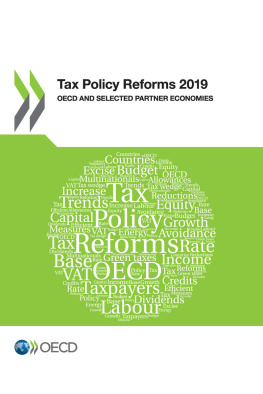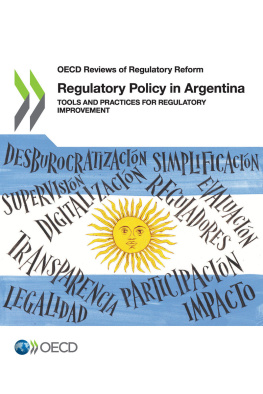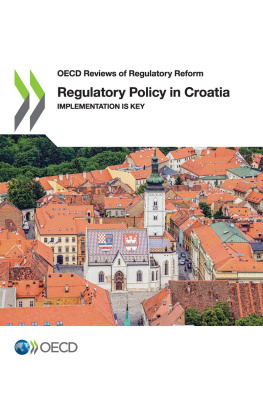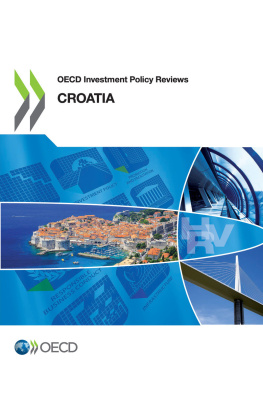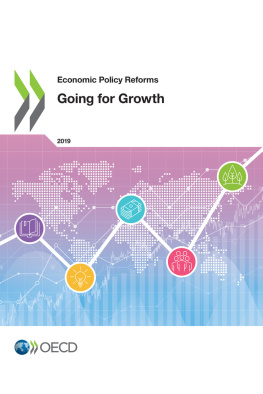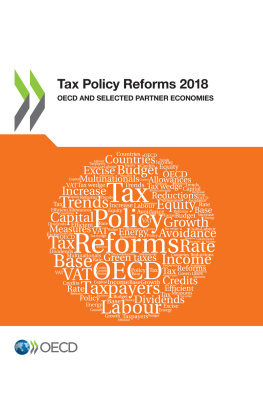OECD - Tax Policy Reforms 2019
Here you can read online OECD - Tax Policy Reforms 2019 full text of the book (entire story) in english for free. Download pdf and epub, get meaning, cover and reviews about this ebook. year: 2019, publisher: OECD Publishing, genre: Politics. Description of the work, (preface) as well as reviews are available. Best literature library LitArk.com created for fans of good reading and offers a wide selection of genres:
Romance novel
Science fiction
Adventure
Detective
Science
History
Home and family
Prose
Art
Politics
Computer
Non-fiction
Religion
Business
Children
Humor
Choose a favorite category and find really read worthwhile books. Enjoy immersion in the world of imagination, feel the emotions of the characters or learn something new for yourself, make an fascinating discovery.
Tax Policy Reforms 2019: summary, description and annotation
We offer to read an annotation, description, summary or preface (depends on what the author of the book "Tax Policy Reforms 2019" wrote himself). If you haven't found the necessary information about the book — write in the comments, we will try to find it.
OECD: author's other books
Who wrote Tax Policy Reforms 2019? Find out the surname, the name of the author of the book and a list of all author's works by series.
Tax Policy Reforms 2019 — read online for free the complete book (whole text) full work
Below is the text of the book, divided by pages. System saving the place of the last page read, allows you to conveniently read the book "Tax Policy Reforms 2019" online for free, without having to search again every time where you left off. Put a bookmark, and you can go to the page where you finished reading at any time.
Font size:
Interval:
Bookmark:
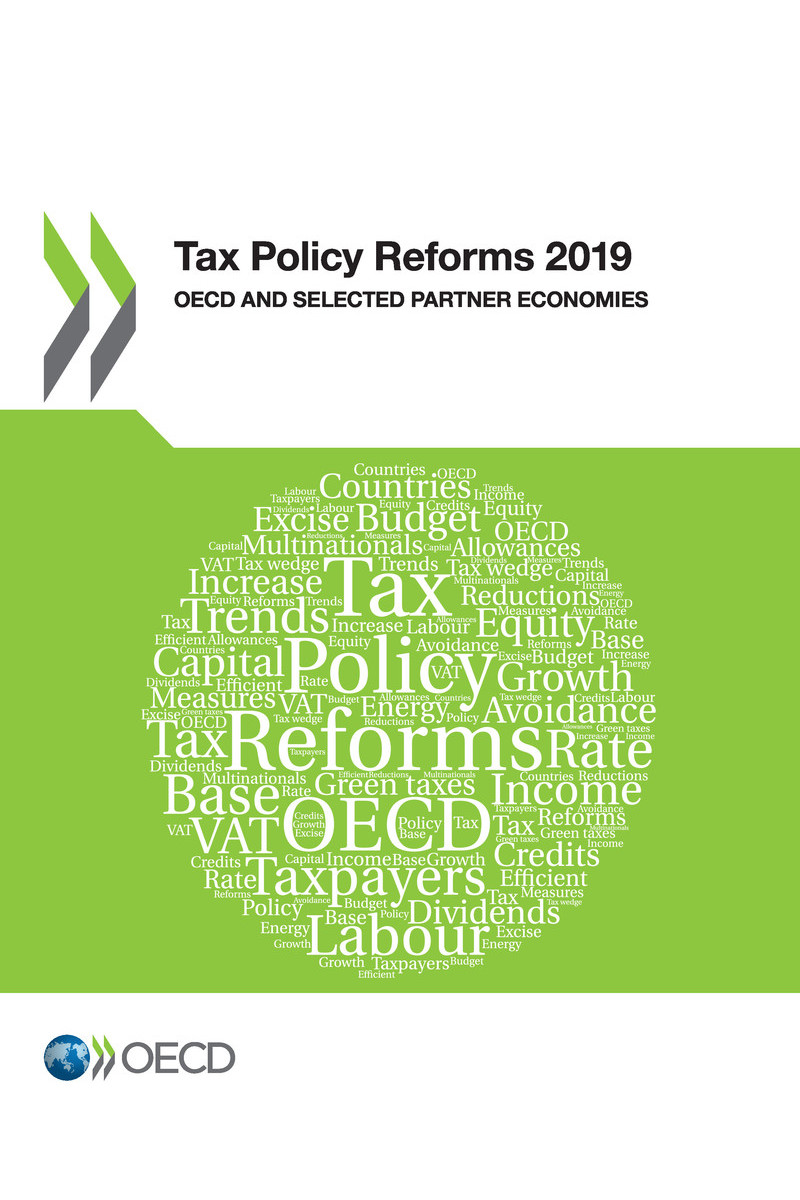
OECD (2019), Tax Policy Reforms 2019: OECD and Selected Partner Economies , OECD Publishing, Paris, https://doi.org/10.1787/da56c295-en .
This is the fourth edition of Tax Policy Reforms: OECD and Selected Partner Economies , which is an annual publication that provides comparative information on tax reforms across countries and tracks tax policy developments over time. The report covers the latest tax policy reforms in all OECD countries, as well as in Argentina, Indonesia and South Africa.
This report was produced by the Tax Policy and Statistics Division of the OECDs Centre for Tax Policy and Administration. It was led by Sarah Perret and written jointly with Vronique Salins (Economics Department), Luisa Dressler and Sean Kennedy (Centre for Tax Policy and Administration), under the supervision of Bert Brys. The authors would like to thank the delegates of Working Party No.2 on Tax Policy Analysis and Tax Statistics and the Committee on Fiscal Affairs for their inputs. The authors would also like to acknowledge Piet Battiau, Sveinbjorn Blondal, David Bradbury, Michelle Harding, Nigel Pain and Kurt Van Dender for their helpful comments, and Karena Garnier, Natalie Lagorce and Michael Sharratt for their assistance with formatting and communication.
This report was approved by the Committee on Fiscal Affairs on 19 July 2019 and prepared for publication by the OECD Secretariat.
This is the 2019 edition of Tax Policy Reforms: OECD and Selected Partner Economies , an annual publication that provides comparative information on tax reforms across countries and tracks tax policy developments over time. The report covers the latest tax policy reforms in all OECD countries, as well as in Argentina, Indonesia and South Africa.
Fewer countries have introduced comprehensive tax reform packages in 2019 compared to previous years. The most comprehensive tax reform was introduced in the Netherlands. Other significant tax changes are being implemented in Lithuania (labour taxes), Australia (personal and corporate income taxes), Italy (corporate income tax) and Poland (personal and corporate income taxes). In other countries, tax reforms in 2019 have been less significant and have often been undertaken in a piecemeal fashion. The challenges ahead, including the prospects of weakening economic growth in some countries, income and wealth inequality, the changing nature of work as well as climate change will require bolder tax reforms, implemented in conjunction with other structural reforms.
The report identifies a number of common tax reform trends across countries:
In the area of personal income taxes (PIT), the report confirms that countries are continuing to cut labour taxes, after several years of PIT increases following the crisis. In 2019, most of the countries that have introduced PIT reforms are cutting PIT rates and narrowing PIT bases. These reforms are expected to reduce tax revenues, at least in the short term. A stated rationale for these reforms among many countries is to support employment and those on low and middle incomes. While this trend represents a broad continuation of PIT reforms in recent years, the previous focus on tax rate cuts has slowed while base narrowing has intensified. Regarding the taxation of personal capital income, reforms have tended towards modest increases in tax rates on capital gains and dividends. Some countries have also expanded tax incentives to support pension savings and small savers.
With respect to social security contributions (SSCs), reforms have been modest in 2019 and SSCs remain high in many countries. Broadly, SSC reforms in 2019 tended to focus on SSC rate cuts rather than increases and were evenly split between base narrowing and broadening measures.
Corporate income tax (CIT) rate cuts have continued in 2019, but these rate reductions have been less significant than the ones introduced in 2018. Interestingly, the countries that are introducing the most significant CIT rate reductions tend to be those that exhibit higher initial CIT rates, leading to further convergence in CIT rates across countries. Many countries have also reinforced the generosity of their corporate tax incentives to stimulate investment and innovation.
With regard to international taxation, efforts to protect CIT bases against corporate tax avoidance have continued with the adoption of significant reforms in line with the OECD/G20 Base Erosion and Profit Shifting (BEPS) project. The tax challenges arising from the increasing digitalisation of the economy continue to give rise to concern among countries. Efforts to achieve a consensus-based multilateral solution to address those challenges are ongoing, but some countries are considering or have implemented interim measures to tax certain revenues from digital services in the meantime.
The stabilisation of standard value-added tax (VAT) rates observed across countries in the last couple of years is continuing. High standard VAT rates in many countries have limited the room for additional rate increases without generating potentially high efficiency and equity costs. Instead, many countries have concentrated their efforts on the fight against VAT fraud to raise additional revenues and strengthen the functioning and fairness of VAT systems. Importantly, some of the recent anti-fraud measures, especially the expansion of the domestic reverse charge mechanism and split payments, involve major changes to the way VAT has traditionally been collected. In addition, significant efforts are being made to ensure the effective taxation of cross-border trade. Partly to compensate for high standard VAT rates, a number of countries have expanded the scope of their reduced VAT rates. While these measures are typically justified as a way to enhance fairness or support specific industries, evidence has shown that they tend to be poorly targeted policy instruments. Trends in excise duties show continuing tax increases to deter harmful consumption, focused in particular on tobacco products and sugar-sweetened beverages. Finally, new trade tariffs have been introduced, which could lead to further escalations in the future.
Font size:
Interval:
Bookmark:
Similar books «Tax Policy Reforms 2019»
Look at similar books to Tax Policy Reforms 2019. We have selected literature similar in name and meaning in the hope of providing readers with more options to find new, interesting, not yet read works.
Discussion, reviews of the book Tax Policy Reforms 2019 and just readers' own opinions. Leave your comments, write what you think about the work, its meaning or the main characters. Specify what exactly you liked and what you didn't like, and why you think so.

